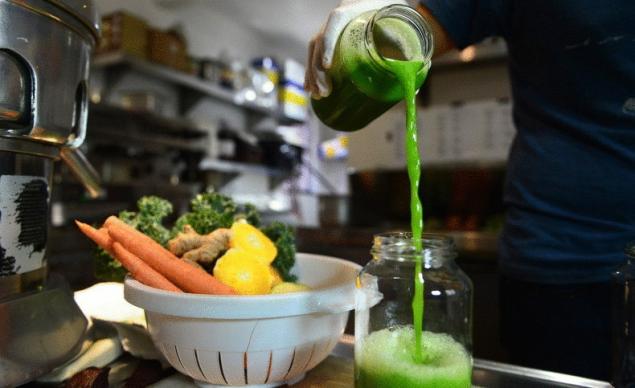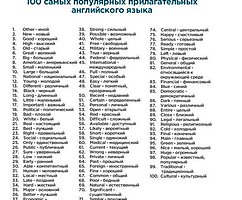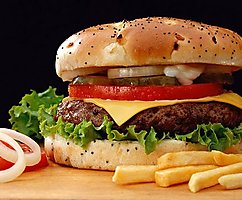The concept of "detoxification" does not actually exist
 Bashny.Net
Bashny.Net
The concept of "detoxification" does not actually exist. From a medical point of view is nonsense. The only way to Wellness is proper nutrition and exercise. But which of the latest trends in healthy lifestyle can give real results? Look at the facts.

Industry detox does everything to drag us into their maelstrom, beautifully portraying falling in the water a cucumber or models sitting next to pile of vegetables. The idea that we can atone for my caloric sins is the perfect antidote for the common lifestyle in the style of fast food and alcohol-soaked social life. But before you blow off the dust with a juicer or go to the clinic for bowel irrigation, you need something to know: detoxing – the idea that we can clean our body from all that pollutes it, and then the internal organs will become crystal clear and will desire to work – it's just a Scam. This pseudomedical concept designed to sell us the goods.
Says Emeritus Professor complementary medicine Exeter University, Edzard Ernst,"let's be clear: there are two types of detox: one is acceptable and the other not." According to Ernst, the appropriate way is the medical treatment of people suffering from life-threatening drug addiction. "Another way is the word used by entrepreneurs, crooks and charlatans for selling bogus treatment that allegedly detoxifies the body from accumulated in it of toxins."
According to Ernst, if the body has accumulated this amount of toxins that he could not withdraw on their own, most likely the person would die or need serious medical intervention. "In a healthy body detoxification carry out the kidneys, liver, skin and even lungs. No known way to make something that works perfectly in a healthy body work better – and it is certainly not under the force of detoxifying treatment."
The main theme of the advertising chatter are "toxins": poisonous substances that we eat or breathe. However, it is unknown what exactly are these toxins. If they were named, it would be possible to measure their number before and after treatment to check its effectiveness. In 2009 a team of scientists gathered by the British charity Sense about Science contacted the manufacturers of the fifteen sold in pharmacies and supermarkets stock products that are supposed to cleanse the body of toxins. It was a variety of products, from dietary supplements to smoothies and shampoos. When the scientists asked for evidence supporting the above statements, none of the producers could not explain what was meant by "detox", not to mention the fact to name the toxins.
However, inexplicably, the shelves in health food stores are still crammed with products with the word "detoxifying". But in fact, the toxins our body can't clean no pills, no tea, no masks, no shampoos or diet.
Another alleged version of the cleansing of the body – irrigation of the intestine. His supporters will tell you that in your gut for months or even years may contain harmful residues of compacted excrement that set in your body of disease-causing toxins. But for a modest fee, they'll put in you hose and wash you from all superfluous. Unfortunately for them – and perhaps fortunately for us – none of the doctors have never seen these mysterious deposits, and many doctors even warn against undergoing such procedure, for the reason that it can lead to the formation of a bowel.
Perhaps it is the uncertain nature of the concept of "detoxification" helped him to avoid suspicion from the public. Often we think of detox after a heavy weekend. In this case, detoxification from alcohol seems like a good idea. According to an experienced dietitian from the hospital. St. George Catherine Collins, "days without alcohol as part of lifestyle, which is definitely a good thing. This will likely give you a chance to reconsider its attitude to alcohol, if you drink too much. But the idea that the liver is somehow in need of "cleansing" is just ridiculous [...] We know that a small amount of alcohol can be beneficial. Maybe because its sedative effect relaxes you slightly or because it supports content in the liver detoxifying enzymes that help the body cope with the intake of other toxins. Therefore, the governmental recommendations does not say "do not drink"; they say "okay, drink, but in moderation". It turns out that doesn't kill us heals us."
This saying is applicable even in the most unexpected situations – broccoli, favorite healthy food. Broccoli really helps the liver, but in spite of his Almighty way, this vegetable is not a hero. As in all the cruciferous vegetables, broccoli contains cyanide. The consumption of this vegetable entails ingested small amounts of poison that, like alcohol, furnishes the liver enzymes, by which it is easier to cope with other toxic substances.
Collins laughs at the concept of "super-product". According to the dietitian, "most people think that you need to limit the use of certain groups of products, or to give them special attention, but this is absolutely not true. The "detoxifying" lifestyle is Smoking cessation, exercise and a healthy balanced diet, e.g. Mediterranean diet".
In the Mediterranean diet include meat, fish, olive oil, cheeses, salads, wholegrain cereals, nuts and fruit. All these products supply our body with protein, amino acids, unsaturated fats, fibre, starches, vitamins and minerals, which in turn ensures the perfect functioning of the immune system is the main protector from diseases.
So why, despite the fact that the doctors allowed us to indulge ourselves with such a variety of products, we feel the need to punish yourself to be healthier? One of the versions is that such a desire is associated with entrenched religions in the ancient traditions of fasting and purification.
Professor of psychology at city University London Peter Ayton suggests that the desire to drink for detoxification products due to the proliferation of beauty and proper nutrition. Ayton believes that we are susceptible to marketing ploys because we live in a world with so much information that they are happy to delegate responsibility to others who can better understand certain things. "To understand the shampoo, you need to have a doctorate in biochemistry, but for many people it is not. If something seems reasonable and plausible, but also evokes a familiar concept, such as "detoxification," we gladly recognize" says Ayton.
Professor Ayton adds that many of our consumer decisions are due to ignorance and assumptions that are rarely contested. "People believe that the world is carefully controlled, and that there are noble institutions, shielding them from various errors. Many marketers are secretly fueling this idea. So when people see someone with a good track record, they think that listening to a respected medic, and believe his advice."
Professor Ernst is showing less indulgence: "Ask anyone who sets trading standards, as they struggle with this. Anyone who says "I have a detoxifying treatment" profiting on lies, and is by definition a crook. The pursuit of the rogues shouldn't be left to scientists and charities".
Source: mixednews.ru/archives/69445

Industry detox does everything to drag us into their maelstrom, beautifully portraying falling in the water a cucumber or models sitting next to pile of vegetables. The idea that we can atone for my caloric sins is the perfect antidote for the common lifestyle in the style of fast food and alcohol-soaked social life. But before you blow off the dust with a juicer or go to the clinic for bowel irrigation, you need something to know: detoxing – the idea that we can clean our body from all that pollutes it, and then the internal organs will become crystal clear and will desire to work – it's just a Scam. This pseudomedical concept designed to sell us the goods.
Says Emeritus Professor complementary medicine Exeter University, Edzard Ernst,"let's be clear: there are two types of detox: one is acceptable and the other not." According to Ernst, the appropriate way is the medical treatment of people suffering from life-threatening drug addiction. "Another way is the word used by entrepreneurs, crooks and charlatans for selling bogus treatment that allegedly detoxifies the body from accumulated in it of toxins."
According to Ernst, if the body has accumulated this amount of toxins that he could not withdraw on their own, most likely the person would die or need serious medical intervention. "In a healthy body detoxification carry out the kidneys, liver, skin and even lungs. No known way to make something that works perfectly in a healthy body work better – and it is certainly not under the force of detoxifying treatment."
The main theme of the advertising chatter are "toxins": poisonous substances that we eat or breathe. However, it is unknown what exactly are these toxins. If they were named, it would be possible to measure their number before and after treatment to check its effectiveness. In 2009 a team of scientists gathered by the British charity Sense about Science contacted the manufacturers of the fifteen sold in pharmacies and supermarkets stock products that are supposed to cleanse the body of toxins. It was a variety of products, from dietary supplements to smoothies and shampoos. When the scientists asked for evidence supporting the above statements, none of the producers could not explain what was meant by "detox", not to mention the fact to name the toxins.
However, inexplicably, the shelves in health food stores are still crammed with products with the word "detoxifying". But in fact, the toxins our body can't clean no pills, no tea, no masks, no shampoos or diet.
Another alleged version of the cleansing of the body – irrigation of the intestine. His supporters will tell you that in your gut for months or even years may contain harmful residues of compacted excrement that set in your body of disease-causing toxins. But for a modest fee, they'll put in you hose and wash you from all superfluous. Unfortunately for them – and perhaps fortunately for us – none of the doctors have never seen these mysterious deposits, and many doctors even warn against undergoing such procedure, for the reason that it can lead to the formation of a bowel.
Perhaps it is the uncertain nature of the concept of "detoxification" helped him to avoid suspicion from the public. Often we think of detox after a heavy weekend. In this case, detoxification from alcohol seems like a good idea. According to an experienced dietitian from the hospital. St. George Catherine Collins, "days without alcohol as part of lifestyle, which is definitely a good thing. This will likely give you a chance to reconsider its attitude to alcohol, if you drink too much. But the idea that the liver is somehow in need of "cleansing" is just ridiculous [...] We know that a small amount of alcohol can be beneficial. Maybe because its sedative effect relaxes you slightly or because it supports content in the liver detoxifying enzymes that help the body cope with the intake of other toxins. Therefore, the governmental recommendations does not say "do not drink"; they say "okay, drink, but in moderation". It turns out that doesn't kill us heals us."
This saying is applicable even in the most unexpected situations – broccoli, favorite healthy food. Broccoli really helps the liver, but in spite of his Almighty way, this vegetable is not a hero. As in all the cruciferous vegetables, broccoli contains cyanide. The consumption of this vegetable entails ingested small amounts of poison that, like alcohol, furnishes the liver enzymes, by which it is easier to cope with other toxic substances.
Collins laughs at the concept of "super-product". According to the dietitian, "most people think that you need to limit the use of certain groups of products, or to give them special attention, but this is absolutely not true. The "detoxifying" lifestyle is Smoking cessation, exercise and a healthy balanced diet, e.g. Mediterranean diet".
In the Mediterranean diet include meat, fish, olive oil, cheeses, salads, wholegrain cereals, nuts and fruit. All these products supply our body with protein, amino acids, unsaturated fats, fibre, starches, vitamins and minerals, which in turn ensures the perfect functioning of the immune system is the main protector from diseases.
So why, despite the fact that the doctors allowed us to indulge ourselves with such a variety of products, we feel the need to punish yourself to be healthier? One of the versions is that such a desire is associated with entrenched religions in the ancient traditions of fasting and purification.
Professor of psychology at city University London Peter Ayton suggests that the desire to drink for detoxification products due to the proliferation of beauty and proper nutrition. Ayton believes that we are susceptible to marketing ploys because we live in a world with so much information that they are happy to delegate responsibility to others who can better understand certain things. "To understand the shampoo, you need to have a doctorate in biochemistry, but for many people it is not. If something seems reasonable and plausible, but also evokes a familiar concept, such as "detoxification," we gladly recognize" says Ayton.
Professor Ayton adds that many of our consumer decisions are due to ignorance and assumptions that are rarely contested. "People believe that the world is carefully controlled, and that there are noble institutions, shielding them from various errors. Many marketers are secretly fueling this idea. So when people see someone with a good track record, they think that listening to a respected medic, and believe his advice."
Professor Ernst is showing less indulgence: "Ask anyone who sets trading standards, as they struggle with this. Anyone who says "I have a detoxifying treatment" profiting on lies, and is by definition a crook. The pursuit of the rogues shouldn't be left to scientists and charities".
Source: mixednews.ru/archives/69445
Tags
See also
Fat burning hormone irisin: to lose weight and become healthier
The truth about the tests iq, taken as a really
5 myths about healthy lifestyles
20 simple tricks to health of every day
For a healthy life: against whom are friends?
Healthy lifestyle for men
The famous phrase-motivators for a healthy lifestyle
How to get rid of cellulite with plain water

















